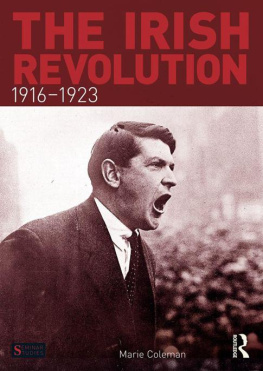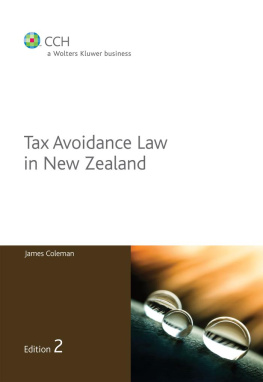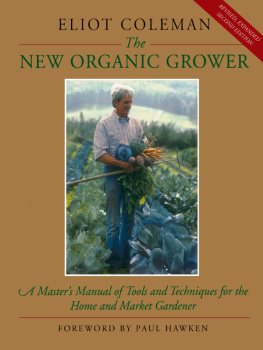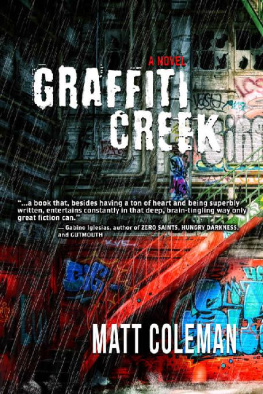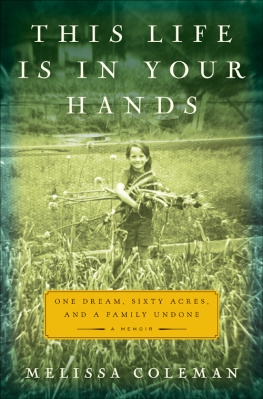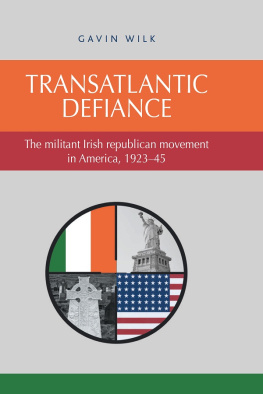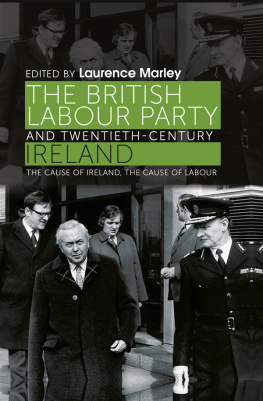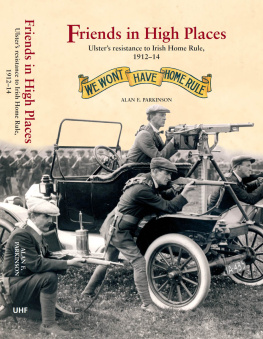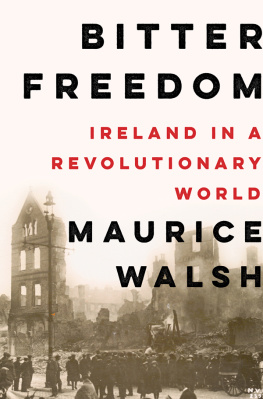The Irish Revolution, 19161923
This Seminar Studies volume is a concise study of the Irish revolution of 1916 to 1923, during which Ireland changed from a unified island that was an integral part of the United Kingdom to an island divided into an effectively independent 26-county Free State and a devolved government in Northern Ireland which remained within the UK.
Marie Coleman covers the key events from the Easter Rising to the Irish Civil War and incorporates the most recent historiography on the subject. The book treats key themes such as labour, gender, sectarianism, the nature of revolutionary violence and the social background and motivation of revolutionaries.
Irish Revolution includes a document section that will introduce students to the principal primary sources relating to the events and themes covered in the text and further reading sections, all of which makes this the ideal introduction to the subject.
Marie Coleman is a Lecturer in the School of History and Anthropology at the Queen's University of Belfast. She teaches on aspects of Irish history and the Irish revolution at second- and third-year undergraduate level, and is the author of two books, The Irish Sweep: A History of the Irish Hospitals Sweepstake, 19301987 (2009) and County Longford and the Irish Revolution, 19101923 (2003).
Introduction to the series
History is narrative constructed by historians from traces left by the past. Historical enquiry is often driven by contemporary issues and, in consequence, historical narratives are constantly reconsidered, reconstructed and reshaped. The fact that different historians have different perspectives on issues means that there is also often controversy and no universally agreed version of past events. Seminar Studies was designed to bridge the gap between current research and debate, and the broad, popular general surveys that often date rapidly.
The volumes in the series are written by historians who are not only familiar with the latest research and current debates concerning their topic, but who have themselves contributed to our understanding of the subject. The books are intended to provide the reader with a clear introduction to a major topic in history. They provide both a narrative of events and a critical analysis of contemporary interpretations. They include the kinds of tools generally omitted from specialist monographs: a chronology of events, a glossary of terms and brief biographies of who's who'. They also include bibliographical essays in order to guide students to the literature on various aspects of the subject. Students and teachers alike will find that the selection of documents will stimulate discussion and offer insight into the raw materials used by historians in their attempt to understand the past.
Clive Emsley and Gordon Martel
Series Editors
The Irish Revolution, 19161923
Marie Coleman
For Aoife and Niamh Martin
First published 2014
by Routledge
2 Park Square, Milton Park, Abingdon, Oxon OX14 4RN
and by Routledge
711 Third Avenue, New York, NY 10017
Routledge is an imprint of the Taylor & Francis Group, an informa business
2014 Marie Coleman
The right of Marie Coleman to be identified as author of this work has been asserted by her in accordance with sections 77 and 78 of the Copyright, Designs and Patents Act 1988.
All rights reserved. No part of this book may be reprinted or reproduced or utilised in any form or by any electronic, mechanical, or other means, now known or hereafter invented, including photocopying and recording, or in any information storage or retrieval system, without permission in writing from the publishers.
Trademark notice: Product or corporate names may be trademarks or registered trademarks, and are used only for identification and explanation without intent to infringe.
British Library Cataloguing-in-Publication Data
A catalogue record for this book is available from the British Library
Library of Congress Cataloging in Publication Data
A catalog record for this book has been requested
ISBN: 978-0-415-73687-9 (hbk)
ISBN: 978-1-408-27910-6 (pbk)
ISBN: 978-1-315-81341-7 (ebk)
Typeset in 10/13.5pt ITC Berkeley
by Graphicraft Limited, Hong Kong
AARIR American Association for the Recognition of the Irish Republic
BMH Bureau of Military History
CBS Christian Brothers school
CID Criminal Investigation Department
DMP Dublin Metropolitan Police
FOIF Friends of Irish Freedom
GHQ General Headquarters
GPO General Post Office
ICA Irish Citizen Army
IPP Irish Parliamentary Party
IRA Irish Republican Army
IRB Irish Republican Brotherhood
ITGWU Irish Transport and General Workers Union
IVF Irish Volunteer Force
LGB Local Government Board
MP Member of Parliament
PRSTV Proportional representation (by single transferable vote)
RIC Royal Irish Constabulary
RUC Royal Ulster Constabulary
ROIA Restoration of Order in Ireland Act
SF Sinn Fin
TD Teachta Dla
USC Ulster Special Constabulary
UVF Ulster Volunteer Force
| 1912 |
| 11 April | The third home rule bill is introduced in the House of Commons. |
| 28 September | Over 200,000 unionists sign the Ulster Solemn League and Covenant in opposition to home rule and over 200,000 women sign a similar declaration. |
| 1913 |
| 31 January | The Ulster Volunteer Force (UVF) is established to resist home rule. |
| 26 August | Dublin tram drivers go on strike in support of trade union recognition sparking a lock-out of 20,000 industrial workers that lasted until early 1914. |
| 25 November | The Irish Volunteer Force is founded in Dublin. |
| 1914 |
| 5 April | Cumann na mBan, the women's auxiliary of the Irish Volunteers, holds its inaugural meeting. |
| 245 April | The UVF lands over 35,000 rifles and five million rounds of ammunition in the Larne gun-running. |
| 25 July | The Irish Volunteers land guns at Howth and three Volunteer supporters are shot dead by British soldiers at Bachelor's Walk in Dublin. |
| 18 September | The third home rule bill becomes law but is suspended for the duration of the war. Provision will be made for the exclusion of part of Ulster. |
| 20 September | John Redmond makes a speech at Woodenbridge, County Wicklow, encouraging Irish Volunteers to enlist in the army. |
| 1916 |
| 21 April | Roger Casement is arrested at Banna strand on Good Friday. |
| 23 April | Eoin MacNeill's countermanding order is published in the Sunday Independent on Easter Sunday. |
| 24 April | The Easter Rising starts when the GPO is occupied and the Irish Republic declared. |
| 29 April | Patrick Pearse surrenders, signalling the end of the Easter Rising. |
| 312 May | Fourteen rebels are executed in Dublin and Thomas Kent is executed in Cork. |
| 23 June | A majority of the Irish Party's supporters accept the offer of home rule for 26 counties. |
| 20 July | The home rule negotiations collapse. |
| 3 August | Roger Casement is hanged in Pentonville Prison. |
| 1917 |
| 3 February | Count Plunkett (SF) wins the Roscommon North by-election. |
| 9 May | Joseph McGuinness (SF) wins the Longford South by-election. |
| 10 July | Eamon de Valera (SF) wins the Clare East by-election. |
| 10 August | |
Next page
